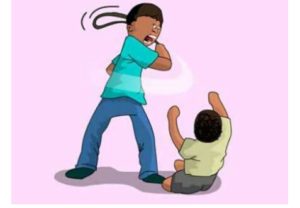Child abuse:- child Abuse is any form of maltreatment by an adult, which is violent or threatening for the child. This includes neglect.
Type of child abuse
There are four type of child abuse
1) physical abuse :- Physical abuse happens when a child has been hurt or injured, and it is not an accident. Physical abuse does not always leave visible marks or injuries.
Physical abuse can include:
hitting
shaking
choking
smothering
throwing
burning
biting
poisoning
using physical restraints.
2)Sexual abuse:- Child sexual abuse happens when an adult, teenager or child uses their power or authority to involve another child in sexual activity.
3) emotional abuse:- Emotional abuse happens when a child is treated in a way that negatively impacts their social, emotional or intellectual development.
Emotional abuse can be caused by:
rejection
name calling, teasing or bullying
yelling
criticism
isolation or locking a child up for extended periods
exposure to domestic and family violence.
4) neglect:- Neglect happens when a child’s basic needs are not met, affecting their health and development. Basic needs include:
food
housing and clean living conditions
health care
adequate clothing
personal hygiene
adequate supervision.
Causes of child abuse
The following are the causes of child abuse
1) Domestic violence:-
Children who are part of households where there is frequent domestic violence are prone to becoming victims of abuse themselves. Men who abuse their female partners are responsible for abusing the children in their homes too.
2)Alcohol and drugs abuse:-
Parents who have a history of alcohol and drug abuse can be responsible for child abuse. Dependence of substance abuse is one of the major causes of child abuse and maltreatment which includes physical abuse and intentional neglect. Alcohol or drug-abusing parent is more likely to initiate child abuse with kids of five e years or below
.3) lack of parenting skills
Most parents are naturally gifted while caring for their children, but few may not be able to manage their physical and emotional needs adequately. Many parents would often equate disciplining children with abusing them and will need counselling to understand the role of a parent in a better manner.
4) untreated mental illness :- A parent’s untreated mental illness is a common cause of child abuse. Manic depression or any other illness of the mind can become a prime cause for the parents to be unavailable for the child. A mother may remain withdrawn from her kids or in extreme cases suspect that the child plotting against her. A parent’s suffering is often the cause of subjecting a child to abuse.
5) stress and lack of support:-Many children face psychological mistreatment when their caregivers or parents are under stress. Parents find it difficult to deal with the emotional needs of a child especially when they face stressful situations. Divorces, relationship issues, financial worries and job-related problems can lead to parents meting out abuse to their children. understand her feelings.
How Can You Tell Whether Your Child Has Been a Victim of Abuse?
There is always a nagging fear and doubt about a child’s safety in the minds of parents who are unable to be around her. It is always easy to ignore or overlook signs of abuse especially when you do not know what to look for. Check with your child if anything unusual has happened to him or her during the day, while at school or in daycare. Ask if she feels uncomfortable or frightened about a particular situation or person. You should also keep an eye on any physical or emotional changes you notice. Signs of injury to the body or constant crying and fussiness are direct pointers of your child being an abuse victim.
Tips for Helping Abused Child
On hearing or knowing about abuse of a child, make sure you respond with urgency and care.
Believe what the child has told you and do not repeat it to others without reason.
Never stop them from talking about it or make them feel guilty about it.
Tell the child that he or she is now safe and you will take care of the situation.


Leave a Reply